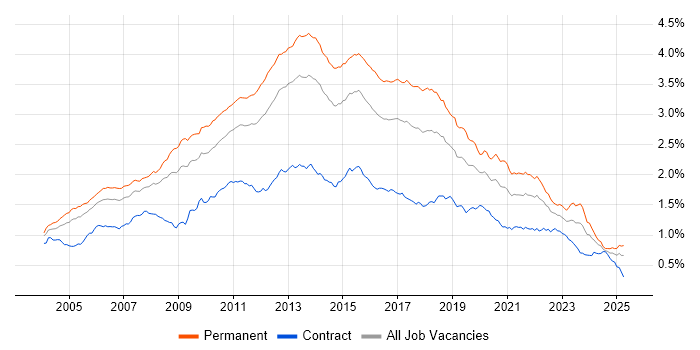Transact-SQL
UK > England
The table below provides summary statistics and salary benchmarking for jobs advertised in England requiring T-SQL skills. It covers permanent job vacancies from the 6 months leading up to 24 February 2026, with comparisons to the same periods in the previous two years.
| 6 months to 24 Feb 2026 |
Same period 2025 | Same period 2024 | |
|---|---|---|---|
| Rank | 443 | 315 | 204 |
| Rank change year-on-year | -128 | -111 | +65 |
| Permanent jobs citing T-SQL | 201 | 404 | 1,003 |
| As % of all permanent jobs in England | 0.33% | 0.95% | 1.50% |
| As % of the Programming Languages category | 1.77% | 2.73% | 4.14% |
| Number of salaries quoted | 165 | 248 | 898 |
| 10th Percentile | £28,000 | £41,250 | £40,000 |
| 25th Percentile | £35,750 | £43,750 | £46,250 |
| Median annual salary (50th Percentile) | £47,500 | £55,500 | £55,000 |
| Median % change year-on-year | -14.41% | +0.91% | -0.90% |
| 75th Percentile | £63,750 | £66,563 | £65,000 |
| 90th Percentile | £82,100 | £82,500 | £78,750 |
| UK median annual salary | £48,500 | £55,000 | £55,000 |
| % change year-on-year | -11.82% | - | -0.90% |
All Programming Languages
England
T-SQL falls under the Programming Languages category. For comparison with the information above, the following table provides summary statistics for all permanent job vacancies requiring coding skills in England.
| Permanent vacancies with a requirement for coding skills | 11,362 | 14,783 | 24,220 |
| As % of all permanent jobs advertised in England | 18.60% | 34.72% | 36.17% |
| Number of salaries quoted | 8,370 | 9,109 | 20,726 |
| 10th Percentile | £33,750 | £38,750 | £36,250 |
| 25th Percentile | £46,250 | £50,000 | £45,000 |
| Median annual salary (50th Percentile) | £62,500 | £65,000 | £60,000 |
| Median % change year-on-year | -3.85% | +8.33% | -7.69% |
| 75th Percentile | £83,750 | £87,500 | £81,250 |
| 90th Percentile | £100,000 | £112,500 | £102,500 |
| UK median annual salary | £62,500 | £65,000 | £60,000 |
| % change year-on-year | -3.85% | +8.33% | -7.69% |
T-SQL
Job Vacancy Trend in England
Historical trend showing the proportion of permanent IT job postings citing T-SQL relative to all permanent IT jobs advertised in England.

T-SQL
Salary Trend in England
Salary distribution trend for jobs in England citing T-SQL.

T-SQL
Salary Histogram in England
Salary distribution for jobs citing T-SQL in England over the 6 months to 24 February 2026.
T-SQL
Job Locations in England
The table below looks at the demand and provides a guide to the median salaries quoted in IT jobs citing T-SQL within the England region over the 6 months to 24 February 2026. The 'Rank Change' column provides an indication of the change in demand within each location based on the same 6 month period last year.
| Location | Rank Change on Same Period Last Year |
Matching Permanent IT Job Ads |
Median Salary Past 6 Months |
Median Salary % Change on Same Period Last Year |
Live Jobs |
|---|---|---|---|---|---|
| London | -84 | 56 | £76,250 | +22.00% | 15 |
| Midlands | -15 | 47 | £48,500 | +2.11% | 18 |
| South East | -28 | 39 | £40,000 | -22.33% | 34 |
| North of England | -21 | 37 | £47,500 | -5.00% | 21 |
| West Midlands | +7 | 30 | £42,500 | -22.73% | 12 |
| Yorkshire | -25 | 25 | £25,000 | -47.92% | 4 |
| South West | -22 | 17 | £42,500 | +2.41% | 8 |
| East Midlands | -32 | 17 | £50,000 | +11.11% | 6 |
| North West | -7 | 9 | £57,500 | +9.52% | 15 |
| East of England | -35 | 5 | £42,175 | -11.21% | 5 |
| North East | -7 | 3 | £51,000 | -32.00% | 3 |
| T-SQL UK |
|||||
T-SQL
Co-Occurring Skills & Capabilities in England by Category
The following tables expand on the one above by listing co-occurrences grouped by category. They cover the same employment type, locality and period, with up to 20 co-occurrences shown in each category:
|
|
||||||||||||||||||||||||||||||||||||||||||||||||||||||||||||||||||||||||||||||||||||||||||||||||||||||||||||||||||||||||||||||
|
|
||||||||||||||||||||||||||||||||||||||||||||||||||||||||||||||||||||||||||||||||||||||||||||||||||||||||||||||||||||||||||||||
|
|
||||||||||||||||||||||||||||||||||||||||||||||||||||||||||||||||||||||||||||||||||||||||||||||||||||||||||||||||||||||||||||||
|
|
||||||||||||||||||||||||||||||||||||||||||||||||||||||||||||||||||||||||||||||||||||||||||||||||||||||||||||||||||||||||||||||
|
|
||||||||||||||||||||||||||||||||||||||||||||||||||||||||||||||||||||||||||||||||||||||||||||||||||||||||||||||||||||||||||||||
|
|
||||||||||||||||||||||||||||||||||||||||||||||||||||||||||||||||||||||||||||||||||||||||||||||||||||||||||||||||||||||||||||||
|
|
||||||||||||||||||||||||||||||||||||||||||||||||||||||||||||||||||||||||||||||||||||||||||||||||||||||||||||||||||||||||||||||
|
|
||||||||||||||||||||||||||||||||||||||||||||||||||||||||||||||||||||||||||||||||||||||||||||||||||||||||||||||||||||||||||||||
|
|
||||||||||||||||||||||||||||||||||||||||||||||||||||||||||||||||||||||||||||||||||||||||||||||||||||||||||||||||||||||||||||||
|
|||||||||||||||||||||||||||||||||||||||||||||||||||||||||||||||||||||||||||||||||||||||||||||||||||||||||||||||||||||||||||||||
